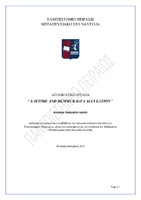Laytime and demmurage calculation

Προβολή/
Περίληψη
Σκοπός: Η πανδημία προκάλεσε διακοπές στις αλυσίδες εφοδιασμού και είχε ως αποτέλεσμα καθυστερήσεις στη διακίνηση των αγαθών. Τα μέτρα καραντίνας, τα lockdown και οι περιορισμοί στη μετακίνηση ανθρώπων και εμπορευμάτων έχουν οδηγήσει σε καθυστερήσεις στις εργασίες φόρτωσης και εκφόρτωσης στα λιμάνια. Σκοπός της παρούσας μεταπτυχιακής μελέτης είναι η σκωπτική παρουσίαση της αποτύπωσης και κατανόησης των ρητρών laytime (σταλία) και demurrage (επισταλία), που πραγματοποιήθηκε μέσω της βιβλιογραφικής ανασκόπησης.
Συμπεράσματα: Η έξαρση της Covid-19, αν και πρωτοφανές για τον παγκόσμιο πληθυσμό, ήταν απλώς μια άλλη κρίση που έπρεπε να αντιμετωπιστεί για τη ναυτιλιακή βιομηχανία. Ωστόσο, το πρόβλημα με τις ασθένειες είναι ότι διαφέρουν σημαντικά ως προς τη σοβαρότητα, την ευκολία μετάδοσης και τις μεθόδους που απαιτούνται για την αντιμετώπισή τους, καθώς εγείρονται προβληματισμοί σχετικά με τους όρους «ανωτέρας βίας», «έκτακτης ανάγκης» και «σοβαρής επιδημικής ή πανδημικής νόσου», λαμβάνοντας υπόψη ότι εμπλέκονται πλείστοι φορείς. Το ζήτημα των ρητρών laytime (σταλία) και demurrage (επισταλία) έχει καταστεί περισσότερο περίπλοκο κατά τη διάρκεια της πανδημίας, με διαφωνίες σχετικά με το εάν η πανδημία αποτελεί γεγονός ανωτέρας βίας που θα επέτρεπε την παράταση του χρόνου ανεξάρτητα από τα ορισθέντα στο ναυλοσύμφωνο. Η έλλειψη εργατικού δυναμικού και εξοπλισμού λόγω των μέτρων κοινωνικής αποστασιοποίησης συνέβαλε επίσης στην καθυστέρηση της κυκλοφορίας των εμπορευμάτων. Αυτές οι καθυστερήσεις είχαν σημαντικό αντίκτυπο στη ναυτιλιακή βιομηχανία, με αποτέλεσμα να προκύψουν διαφωνίες μεταξύ ναυλωτών και πλοιοκτητών σχετικά με τις ρήτρες laytime και demurrage.


